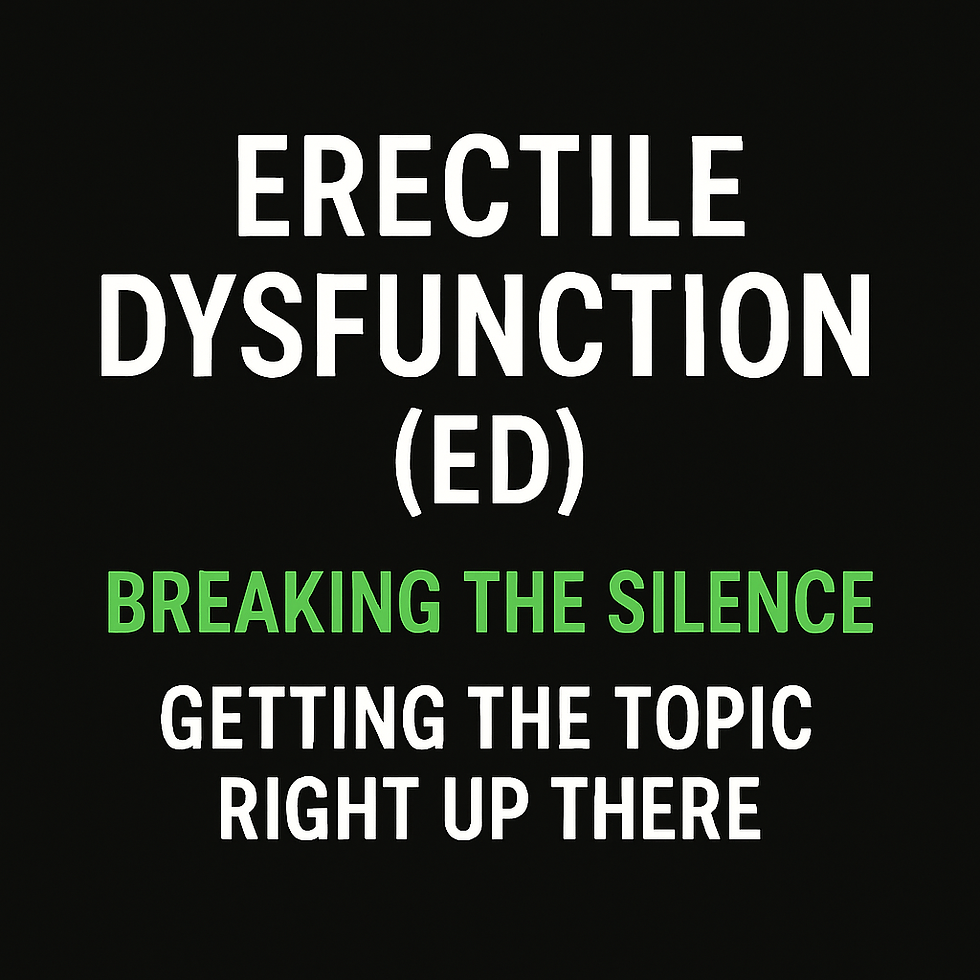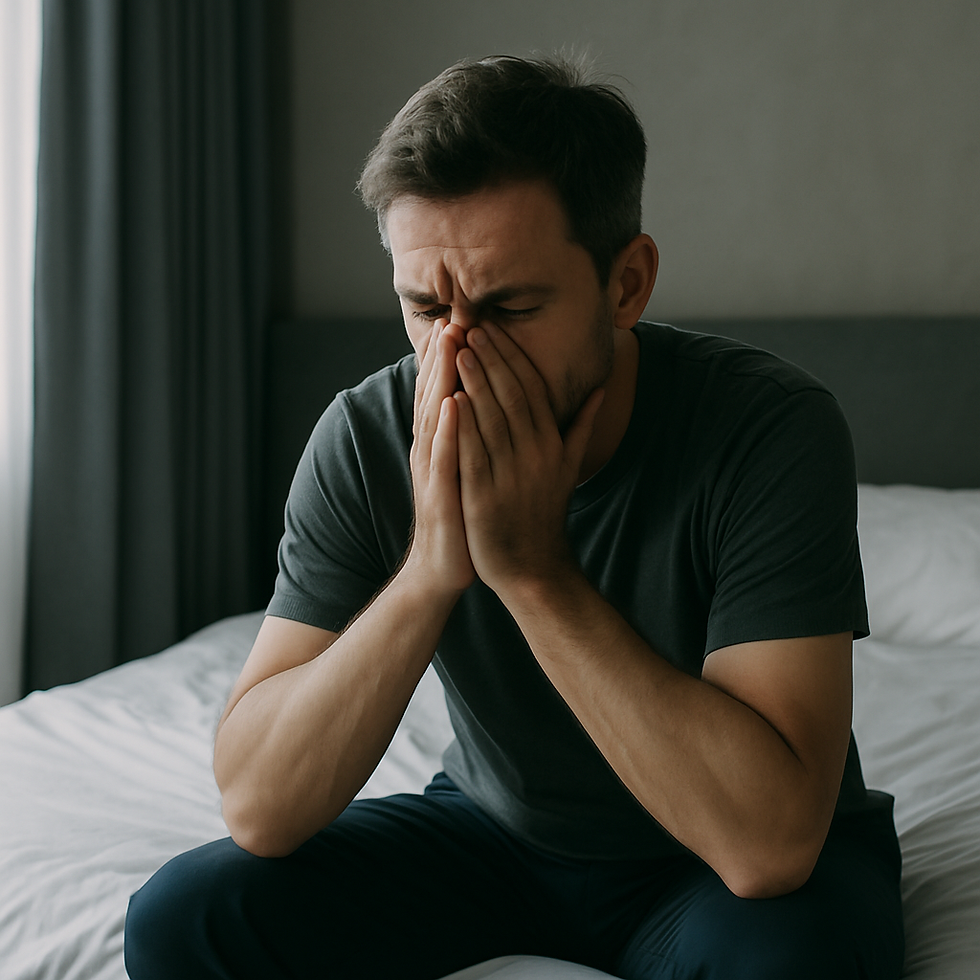Breaking the Silence: Why Talking About Erectile Dysfunction Can Change Everything
- Just Jack Counselling Services

- Jul 31
- 5 min read

Erectile Dysfunction (ED) – two words that can make any man’s stomach drop. For many, it feels like the ultimate blow to masculinity. But here’s the truth: ED is rarely just about sex. It’s about identity, confidence, and self-worth.
Despite how common it is—affecting an estimated one in five men at some point—it’s still one of the biggest taboos men face. Most would rather suffer in silence than talk about it. And that silence? It can destroy relationships, mental health, and self-esteem faster than the problem itself.
Here’s what you need to know: ED often starts in the mind. Stress, anxiety, financial pressures, relationship dynamics—these are some of the most common triggers. And the best way to tackle it isn’t through shame or silence—it’s through talking.
Why Erectile Dysfunction Happens (And It’s Not Always the Bedroom’s Fault)
When a man experiences ED, the first thought is usually, “Something’s physically wrong.” But in reality, most cases—especially in younger and middle-aged men—are caused by psychological factors rather than medical issues.
Common Psychological Causes of ED:
Stress & Anxiety – Whether it’s work deadlines, financial strain, or family pressures, stress is a major libido killer. When your brain is in fight-or-flight mode, it doesn’t care about sex.
Performance Pressure – Society has conditioned men to believe they should “perform on demand.” That expectation creates enormous anxiety, making it harder to relax and enjoy intimacy.
Relationship Strain – Unresolved arguments, lack of connection, or feeling emotionally distant can make sex feel like a chore rather than a choice.
Self-Image & Insecurity – Ever felt like you’re “punching above your weight”? That insecurity can spiral into performance anxiety and avoidance.
Of course, there are medical causes—like diabetes, heart disease, or hormonal imbalances—but they’re less common in men under 50. That’s why it’s crucial to see your GP first to rule out physical issues. Once that’s clear, the next step is addressing what’s going on in your head.
The Hidden Hit to Masculinity: Why ED Feels Like Losing Your Identity

Men often tie their sense of worth to their sexual performance. So when ED happens, it doesn’t just feel like a bedroom problem—it feels like a personal failure.
I’ve been there. Years ago, I went through a rough patch where I lost all interest in sex. At the time, I was married, and the pressure to keep my wife happy only made things worse. The more I couldn’t perform, the more ashamed I felt.
It got so bad that I even questioned my sexuality—but deep down, I knew that wasn’t the issue. The truth? I was drowning in stress. Finances were tight, we were moving house, and I was making big career changes. Later, I started seeing someone younger and far better looking than me—seriously punching above my weight—and that only added pressure.
I did what many men do: went to the doctor to make sure nothing was physically wrong. Everything came back clear. The problem was in my head. I tried the blue pills—they worked, for a bit—but I hated relying on them. They made me feel even less of a man.
What actually helped? Talking. Honest conversations where ED wasn’t treated like a catastrophe. That shift changed everything.
The Silent Strain on Relationships
ED doesn’t just affect men—it impacts their partners too. When intimacy disappears, partners often blame themselves:
“Is he not attracted to me anymore?”
“Am I doing something wrong?”
“Has he gone off me?”
The truth? Most of the time, ED has nothing to do with how a partner looks, acts, or behaves. But here’s the kicker: if you don’t talk about it, they’ll fill in the blanks with worst-case scenarios. That leads to feelings of rejection, insecurity, and resentment.
As a counsellor, I can tell you this: I’ve worked with many clients—men and couples—where ED was the silent issue at the core of their relationship problems. Not because the problem existed, but because it wasn’t talked about.
The Mental Health Link: ED, Anxiety & Depression
ED isn’t just a sexual problem—it’s a mental health issue too. When it hits, confidence tanks. You start avoiding intimacy. Then comes the guilt, the shame, and sometimes isolation. For some men, this spirals into depression.
On the flip side, anxiety and depression can cause ED in the first place. It’s a vicious cycle:
Stress → ED → Shame → More Stress → More ED
That’s why breaking the silence is so critical. Talking about ED isn’t just about saving your sex life—it’s about protecting your mental health.

Why Men Don’t Talk (And Why That’s Dangerous)
Men would rather admit they’ve crashed their car than admit they can’t get an erection. Why?
Fear of ridicule – The idea of mates laughing or gossiping is unbearable.
Cultural conditioning – “Real men don’t talk about feelings.”
The “Man Up” Myth – That toxic belief that vulnerability equals weakness.
But silence is dangerous. It fuels anxiety, deepens relationship problems, and delays solutions.
The Power of Talking (And How to Start Without Feeling Weak)
Here’s the truth: talking about ED isn’t weakness—it’s courage. It takes real strength to say, “I’m struggling.”
With Your Partner: Be honest and direct. Try:
“This isn’t about you. I’m under a lot of stress, and it’s affecting me. I want us to handle this together.”
With a Professional: A counsellor can help you untangle the stress without judgment.
With Yourself: Stop measuring your worth by what happens in the bedroom.
A Simple, Overlooked Tip: Focus on Foreplay
Here’s something practical that can make a massive difference: take the pressure off penetration and focus on foreplay.
Not only does this help your partner feel desired, valued, and sexually satisfied, but it also helps you relax and enjoy the moment. When the focus shifts from “I need to perform” to “I want to connect,” anxiety melts away. It’s a win-win:
Your partner feels wanted, not rejected.
You feel less pressure, which can actually make it easier to perform.
This isn’t about “tricks”—it’s about intimacy. Real intimacy isn’t about perfect erections—it’s about connection.
What About Your Partner? How Women Can Help

If you’re a partner reading this, here’s the deal: ED isn’t about you. It’s rarely a sign your partner doesn’t find you attractive. It’s stress, pressure, and a fear of failure—and piling on more pressure makes it worse.
What Helps:
Reassure him without pity.
Don’t make jokes about it—it cuts deep.
Encourage open conversation without making it a “big event.”
Suggest professional support if it’s ongoing, and frame it as teamwork.
Pills vs. Real Solutions
Medication like Viagra works—but it’s a quick fix, not a cure. If stress is the root cause, the only long-term solution is addressing that stress. That’s why talking, lifestyle changes, and therapy matter.
Practical Steps to Overcome ED (Without Shame)
Rule Out Physical Issues: See your GP to check for underlying conditions.
Manage Stress: Exercise, sleep, and relaxation aren’t “soft” solutions—they’re vital.
Talk to Your Partner: Honesty beats avoidance every time.
Seek Professional Help: Counselling isn’t about weakness—it’s about strength.
Stop the Pressure: Sex should be connection, not performance.

Final Thoughts: ED Doesn’t Define You
Erectile Dysfunction is common. It’s not a verdict on your manhood—it’s a sign something needs attention. And the bravest thing you can do? Talk.
Because the truth is this: your worth as a man isn’t measured by what happens in the bedroom.
Wishing you all a Happy Ending 😉




Comments